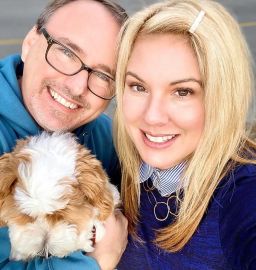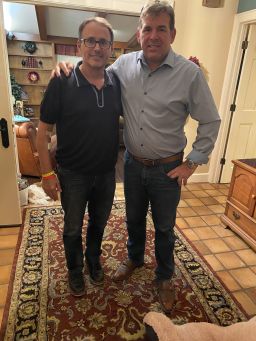Editor’s Note: In a series of essays called The Distance, Thomas Lake is telling the stories of Americans living through the pandemic. Email thomas.lake@cnn.com to share your story idea.
Kevin Rathel was delirious, paralyzed with drugs, trying to comprehend this waking nightmare. He did not know where he was, why they were sticking him with needles, or why someone in a mask was shoving a tube down his throat. Rathel was in a battle he didn’t understand, fighting an enemy he couldn’t see. Those people in masks were the nurses and doctors of Orlando Regional Medical Center. They were trying to save his life.
THE DISTANCE
On the seventh night, they got some help: 11 ounces of gold-colored liquid from the veins of a stranger. A man who’d fought the same enemy and won.
It started the last week of March, when Rathel’s 19-year-old son got sick. He’d been delivering pizza, and it seems he brought the virus home. Rathel’s two daughters got sick, as did his wife, Stacie Rathel. Kevin Rathel was sickest of all. By Thursday, April 2, he couldn’t go upstairs without stopping to catch his breath.
Stacie took him to the hospital, where his condition kept getting worse. Kevin is 52, with no underlying health conditions. On Saturday morning, Stacie got a phone call. They were inducing a coma and putting him on a ventilator.
After the shock wore off, Stacie remembered something she’d read a few weeks earlier. Some patients had improved after receiving blood plasma from others who had recovered from Covid-19. She asked about it, and Dr. Satya Mukkera, the hospital’s director of critical care, agreed to give it a try. Because it’s still an investigational treatment, the hospital needed permission from the FDA. They got it within hours. Now they just needed the plasma.

Rathel’s son wanted to donate, but he was ruled out because he’d never been tested for the virus. Stacie was still recovering, so she wasn’t eligible. A family friend named John Stemberger took up the search. Rathel’s condition deteriorated. One doctor told his wife, “He is the sickest patient we have.”
As Stemberger worked his connections, he got a text about an unrelated matter from someone he knew down in Stuart. Stemberger said it wasn’t a good time. He was looking for a plasma donor, because his friend was dying, and the donor had to meet all these requirements. A positive lab test for Covid-19. A compatible blood type. A full recovery from the disease, and so forth. He said he was looking for a needle in a haystack.
The man in Stuart texted him back: I’m your needle in the haystack.
A race against time

The man in Stuart was James Crocker, 49, founder and president of a company that manufactures specialty vehicles for roadway and runway maintenance. Crocker had gone to a funeral in late February after the tragic death of a 27-year-old nephew, and a few days later began to feel sick. More than a dozen relatives did too. Crocker’s symptoms kept getting worse: nausea, fever, headache, coughing so much he couldn’t sleep. On March 14 he went to the hospital, where he stayed two nights with pneumonia. He went home and began to recover.
As fear and sickness proliferated, Crocker felt immune to both. Although scientific data was limited, with experts urging caution, he felt almost invincible.
Now it was Monday night, April 6. Here was John Stemberger on the phone, talking about his dying friend and his search for a plasma donor. Crocker raised his hand. The blood types were compatible. He’d been symptom-free for more than two weeks. Within an hour, he was on his way to Orlando.
Stories of Americans living through the pandemic
The hard part came the next day, when he tried to find a test showing he no longer had Covid-19. He drove around for hours, calling one contact after another. Finally he got a test at the hospital where Kevin Rathel was being treated, but he was told the results were three or four days away. When he asked a nurse how Kevin was doing, she closed her eyes and shook her head.
“These kids are going to lose their daddy,” Crocker thought.
He went to the Rathels’ house to meet the family. While he was there, Stacie got a call from George Ralls, Orlando Health’s chief quality officer. He’d found an instant test. Crocker went back to the hospital and took it. The negative result came back in minutes.
The next morning Crocker went to OneBlood, the blood-donation center facilitating the transaction. It took about 20 minutes. Someone stuck a needle in his arm. It didn’t even hurt.
‘You’re going to make it’
As he writhed in pain and thought about death, Kevin Rathel kept hearing voices. God, please help Kevin. Later he found out that some of the hospital workers had been praying for him. He’d been afraid of them, confused in his delirium. Now he thought of them as angels.
He received the plasma transfusion on the night of April 8. Grasping for anything that might help, doctors also gave him various drugs with long and complicated names: hydroxychloroquine, azithromycin, tocilizumab. After getting a little worse, he began to get better. The toxins in his liver decreased. He began to need less oxygen. On Easter Sunday, April 12, the doctors brought him out of his coma to see if his body was strong enough to function on its own. Stacie and the kids got to see him on FaceTime. He was still groggy and delirious. One by one, they told him who they were.

“You’re alive, and you’re going to make it,” Stacie told him.
He couldn’t respond because of the tube in his throat, but he seemed to hear them. They saw tears streaming down his cheeks.
The improvement continued. Dr. Mukkera said he couldn’t be sure why. Was it the plasma? The drugs? Some combination? There was no definitive answer. But Stacie was convinced the plasma saved her husband’s life.
On Thursday, April 16, he was strong enough to come off the ventilator. The following Monday he was well enough to go home. As they wheeled him out of the hospital, he was overwhelmed with gratitude. Hospital workers lined the path, cheering for him, but he wanted to cheer for them. His wife drove him home. Here were the neighbors, welcoming him with a car parade. Here at the car window was a man he didn’t know.
A man whose blood was in his veins.
Get our free weekly newsletter
They would be friends for life. James Crocker would probably take Kevin Rathel fishing on his 64-foot boat. Their families would plan a vacation together. But there was no hurry. They had plenty of time, these veterans of the coronavirus wars, and they could do things that most people couldn’t. They bumped fists, and stood close together.
Have you fully recovered from Covid-19? Maybe you can help someone, too. Here’s more information from OneBlood and the American Red Cross



